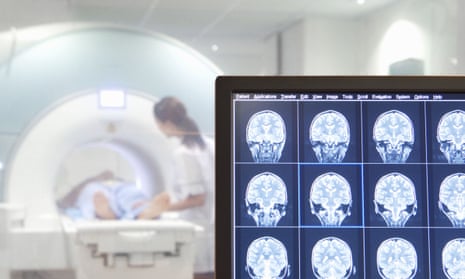Google DeepMindhas announced it is working on a project to improve treatment on head and neck cancers, its third major collaboration with the NHS.
The London-based AI research arm of the online search firm is partnering with University College London Hospital in an attempt to improve the scans available for radiotherapists by using machine learning. The project will use anonymised scans from up to 700 former patients.
Radiotherapy works by bombarding cancerous cells with radiation to kill them, while minimising damage to the healthy cells around them.
Clinicians target the treatment through a process called “segmentation”: literally drawing around different parts of the patient’s anatomy on scans, letting the radiotherapy machines know which tissue to target and which tissue to leave.
The process is particularly painstaking and slow for head and neck cancers, taking about four hours of a clinician’s time. DeepMind believes its machine-learning techniques can reduce that time to one hour.
“Our collaboration will see us carefully analyse anonymised scans from up to 700 former patients at UCLH,” the company said in a blogpost, “to determine the potential for machine learning to make radiotherapy planning more efficient.
“Clinicians will remain responsible for deciding radiotherapy treatment plans, but it is hoped that the segmentation process could be reduced from up to four hours to around an hour.”
Dr Yen-Ching Chang, clinical lead for radiotherapy at UCLH, said: “Developing machine learning which can automatically differentiate between cancerous and healthy tissue on radiotherapy scans will assist clinicians in planning radiotherapy treatment. This has the potential to free up clinicians to spend even more time on patient care, education and research, all of which would be to the benefit of our patients and the populations we serve.”
The DeepMind co-founder Mustafa Suleyman, who has led the company’s health efforts, added: “This real-world application of artificial intelligence (AI) technology is exactly why we set up DeepMind. We’re incredibly excited to be working with the radiotherapy team at UCLH to explore how AI can help to reduce the time it takes to plan radiotherapy treatment for head and neck cancer patients. We hope this work could lead to real benefits for cancer patients across the country and for the clinicians who treat them.”
The collaboration comes after February’s announcement that DeepMind is working with the Royal Free hospital to monitor patients’ kidney functions to help catch and treat acute kidney failure in inpatients, and July’s announcement of a research project in conjunction with Moorfields Eye Hospital, to examine the possibility of using machine learning to identify eye conditions in retinal scans.
As with the other NHS collaborations, the project will raise questions over DeepMind’s data sharing agreements with the health service. DeepMind said: “As with all our work with the NHS, we will treat the patient data we are using in this project with the utmost care and respect. All scans will be anonymised in line with the UCLH Information Governance policy before they are shared with DeepMind.”
UCLH added more information in an FAQ published about the project: “UCLH will rigorously ensure that no personally identifiable data is included in the database of scans provided to DeepMind Health for this project. During the course of the project DeepMind Health must take rigorous measures to protect the security of the data, and may not disclose it to anyone other than the researchers and engineers working on the project.
“Data contributing to this study can only be used for research that explores the use of machine learning to identify and differentiate between healthy and cancerous cells in radiotherapy images.”
“DeepMind Health must securely destroy all copies of anonymised data received through the agreement,” the hospital added.
